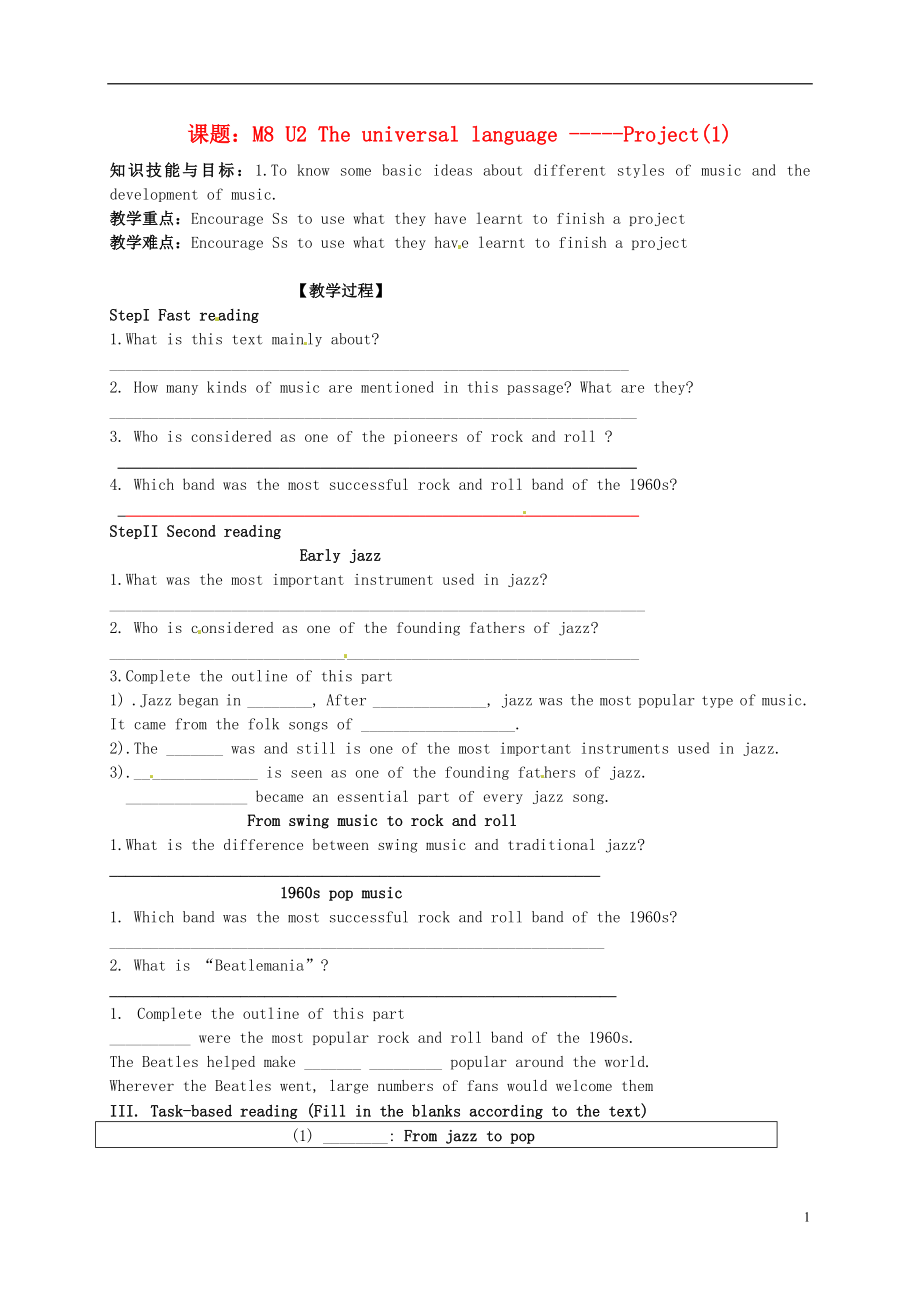《江蘇省寶應(yīng)縣畫川高級(jí)中學(xué)高中英語(yǔ) M8 Unit2 The universal language Project學(xué)案1 牛津譯林版選修8》由會(huì)員分享����,可在線閱讀���,更多相關(guān)《江蘇省寶應(yīng)縣畫川高級(jí)中學(xué)高中英語(yǔ) M8 Unit2 The universal language Project學(xué)案1 牛津譯林版選修8(2頁(yè)珍藏版)》請(qǐng)?jiān)谘b配圖網(wǎng)上搜索。
1��、
課題:M8 U2 The universal language -----Project(1)
知識(shí)技能與目標(biāo):1.To know some basic ideas about different styles of music and the development of music.
教學(xué)重點(diǎn):Encourage Ss to use what they have learnt to finish a project
教學(xué)難點(diǎn):Encourage Ss to use what they have learnt to finish a project
【教學(xué)過程】
StepI
2���、 Fast reading
1.What is this text mainly about?
________________________________________________________________
2. How many kinds of music are mentioned in this passage? What are they?
_________________________________________________________________
3. Who is considered as one of the pione
3��、ers of rock and roll ?
________________________________________________________________
4. Which band was the most successful rock and roll band of the 1960s?
_______________________________________________________________
StepII Second reading
Early jazz
1.What was the most important instr
4����、ument used in jazz?
__________________________________________________________________
2. Who is considered as one of the founding fathers of jazz?
_________________________________________________________________
3.Complete the outline of this part
1) .Jazz began in ________, After _________
5�����、_____, jazz was the most popular type of music. It came from the folk songs of ___________________.
2).The _______ was and still is one of the most important instruments used in jazz.
3)._______________ is seen as one of the founding fathers of jazz.
_______________ became an essential part of e
6���、very jazz song.
From swing music to rock and roll
1.What is the difference between swing music and traditional jazz?
____________________________________________________________
1960s pop music
1. Which band was the most successful rock and roll band of the 1960s?
__________________________
7�、___________________________________
2. What is “Beatlemania”?
______________________________________________________________
1. Complete the outline of this part
__________ were the most popular rock and roll band of the 1960s.
The Beatles helped make _______ _________ popular around the world
8�、.
Wherever the Beatles went, large numbers of fans would welcome them
III. Task-based reading (Fill in the blanks according to the text)
(1) ________: From jazz to pop
Early jazz
·It came from the folk songs of American black (2) ________.
·During the early part of the 19th century, the blues
9、, which (3) ________ to be sad, came into being.
·Jazz sprung up from the blues, for blues lacked (4) ________ and was too sad and slow to dance to.
From R&B to rock and
roll
·From the early 1930s to the 1950s, traditional jazz was (5) ________ by a new trend known as R & B.
·During the early
10�、1950s, one particular style of R & B became (6) ________— rock and roll.
·Big Joe Turner, a black American singer, is thought to be one of the (7) ________ of rock and roll.
1960s pop music
·The Beatles was the (8) ________ rock and roll band of the 1960s.
·The Beatles (9) ________ make Western
11、pop music popular around the world.
·Even though the Beatles (10) ________ in 1970, no group since has ever come close to being as popular or sell as many records.
V. Reading comprehension (Multiple choice)
1. Which of the following is the correct order of music progress?
A. American folk songs
12、 → jazz → the blues → rock and roll → R&B
B. American folk songs → the blues → jazz → R&B → rock and roll
C. the blues → American folk songs → jazz → R&B → rock and roll
D. the blues → American folk songs → jazz → rock and roll → R&B
2. The following are the features of the blues EXCEPT __
13��、______.
A. dull B. sad C. slow D. colorful
3. What is this passage mainly about?
A. A brief introduction to some famous pioneers of different music.
B. The development of pop music over the last one hundred years.
C. Some information about the Beatles.
D. Reasons for the popularity of jazz music.
2
 江蘇省寶應(yīng)縣畫川高級(jí)中學(xué)高中英語(yǔ) M8 Unit2 The universal language Project學(xué)案1 牛津譯林版選修8
江蘇省寶應(yīng)縣畫川高級(jí)中學(xué)高中英語(yǔ) M8 Unit2 The universal language Project學(xué)案1 牛津譯林版選修8

